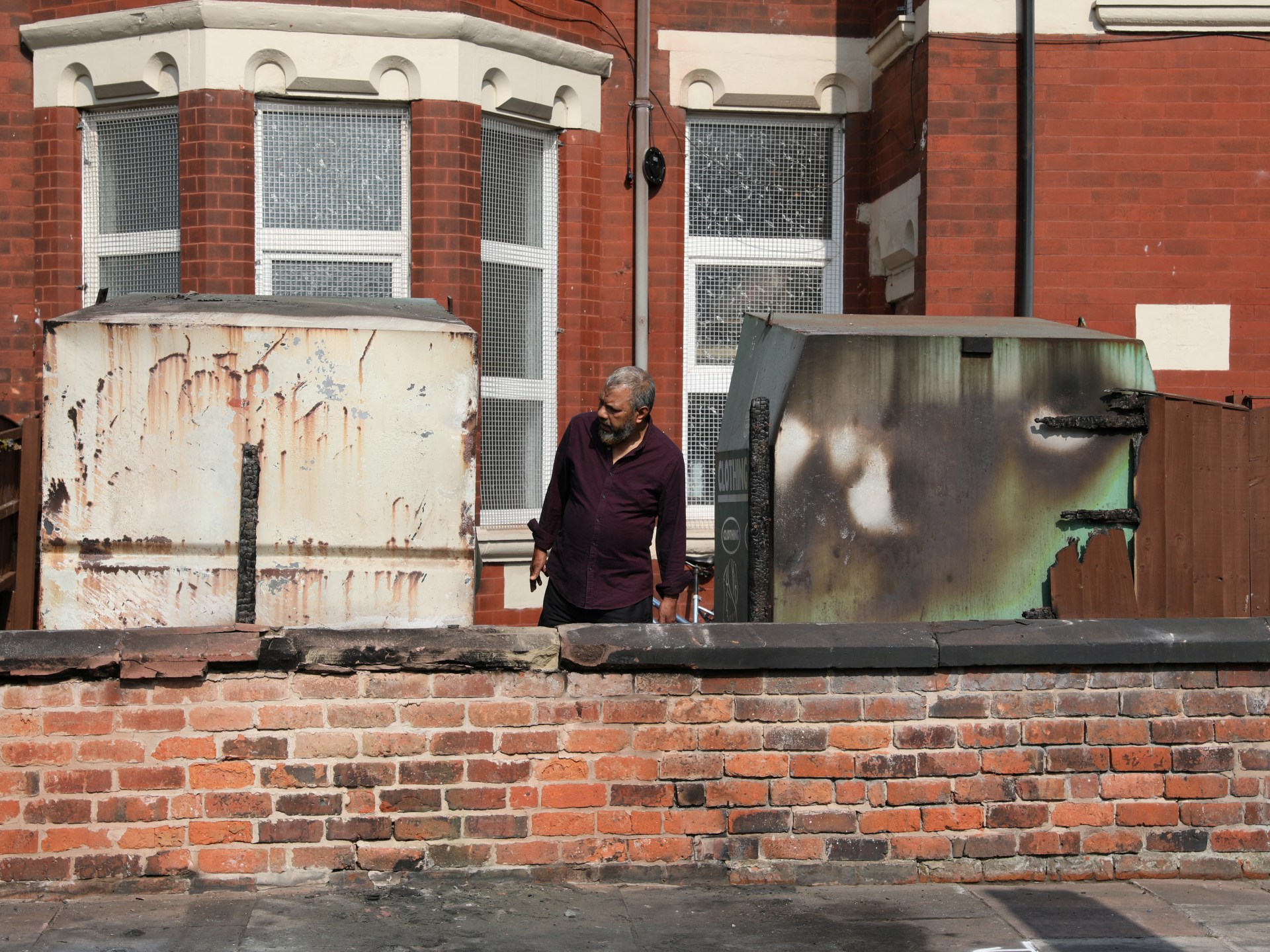Southport stabbing: What led to the spread of disinformation? | Crime News
Angry protesters took to the streets in the British seaside town of Southport and at the official residence of the United Kingdom’s prime minister after a stabbing attack killed three girls this week.
In Southport on Tuesday, protesters hurled bricks at police officers and at a local mosque, injuring more than 50 police officers.
In London on Wednesday, similar protests occurred with demonstrators near Downing Street chanting, “Save our kids,” and “We want our country back.”
At the core of the protests was the belief that the suspect, identified as Axel Rudakubana, 17, and born to Rwandan parents in Cardiff, was a Muslim immigrant, which he was not.
On Thursday, Judge Andrew Menary at Liverpool Crown Court lifted an anonymity order on Rudakubana’s identity due to the unrest erupting.
Rudakubana was also charged on Thursday with three counts of murder, 10 counts of attempted murder and one of possession of a bladed article.
But how did misinformation spread so fast about the suspect’s identity? Here’s what we know:
How did it start?
On Monday, three girls – aged 6, 7 and 9 – were killed in a stabbing attack at a Taylor Swift-themed dance and yoga session for children in Southport. Eight children and two adults were also injured.
Little information was released about the suspect other than he was a 17-year-old because laws in the UK make it a criminal offence to identify a suspect who is a minor until legal proceedings begin.
But in the absence of information from media organisations and the local Merseyside Police, unfounded speculation resulted in a slew of Islamophobic and anti-immigrant posts on social media.
False claims about the suspect’s origins spread like wildfire with some falsely naming him as “Ali al-Shakati” with no official source for the name.
There were also claims that the suspect had arrived in the UK on a small boat in 2023, which was also false.
What was the scale of the misinformation?
Massive, according to Marc Owen Jones, an associate professor of Middle Eastern studies at Doha’s Hamad bin Khalifa University, where his research focuses on information control strategies.
By July 30, a day after the incident, Jones had tracked “at least 27 million impressions [on social media] for posts stating or speculating that the attacker was Muslim, a migrant, refugee or foreigner”, he said on X.
Influencer Andrew Tate also said in a video on X that an “undocumented migrant” who had “arrived on a boat” had attacked the girls in Southport.
“The soul of the Western man is so broken that when the invaders slaughter your daughters, you do absolutely f****** nothing,” Tate said.
Other accounts on X also blamed Muslims for the attack, including Channel 3 Now, purporting to be a news organisation but whose background remains clear, which later issued a “sincere apology and correction” to the spread of the false information.
Who contributed to the misinformation?
On Tuesday, Tommy Robinson, a far-right, anti-Islam campaigner, told his 800,000 followers on X that there was “more evidence to suggest Islam is a mental health issue rather than a religion of peace”.
“They’re replacing the British nation with hostile, violent, aggressive migrants. … Your children don’t matter to [the Labour government],” he said.
According to Merseyside Police, members of the far-right English Defence League, which Robinson co-founded, were among those rioting in Southport on Tuesday.
At the same time, far-right MP Nigel Farage posted a one-minute video on X questioning if the police, who had said the attack was not “terror-related”, were telling the truth.
With all the outpouring of disinformation online, Southport MP Patrick Hurley told BBC’s Radio 4 Today programme on Wednesday that protests were “led by people from outside the town”.
He added that the “thugs who had got the train in” used the “deaths of three little kiddies for their own political purposes”.
On X, Jones also explained that after any attack, there is a clear “attempt to exploit the tragic incident by right-wing influencers and grifters – pushing an anti-immigrant and xenophobic agenda despite there being no evidence”.

What has been the response from the police and government?
After Wednesday’s protest at Downing Street, Prime Minister Keir Starmer denounced the “violent thugs” who clashed with police in London, saying they would “feel the full force of the law”.
London’s Metropolitan Police said on Thursday that 111 people had been arrested for offences including violent disorder and assaults on police officers.
People in Southport also denounced the violent protests and have helped rebuild parts of the local mosque, which was attacked during the protests.
On Thursday, Starmer met with senior police leaders to offer his “full backing” after the “incidents of extreme violence and public disorder”.
“While the right to peaceful protest must be protected at all costs, we will be clear that criminals who exploit that right in order to sow hatred and carry out violent acts will face the full force of the law,” his office said before the meeting.
In the meeting, the prime minister asked police chiefs across the country to improve coordination to tackle violent protests.
Starmer also condemned the protests at a news conference on Thursday, saying, “As far as the far right is concerned, this is coordinated. This is deliberate.”
“This is not a protest that just got out of hand. It is a group of individuals who are absolutely bent on violence.”
southport-stabbing-what-led-to-the-spread-of-disinformation-crime-news
#Southport #stabbing #led #spread #disinformation #Crime #News

